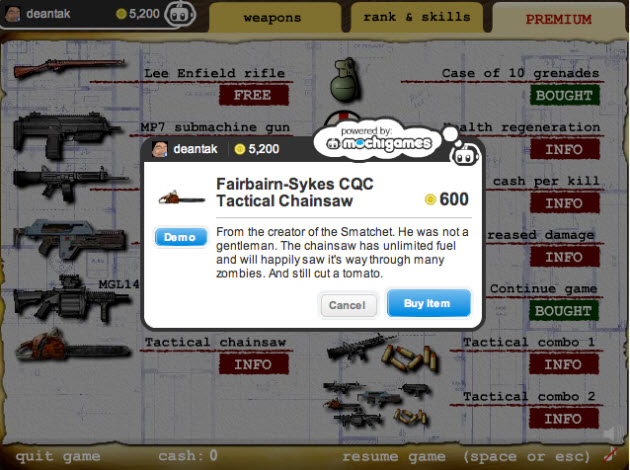 Flash games on the web started out as a hobby. Now there are tens of thousands of them that, through advertising, are generating steady incomes for their creators. And today, Mochi Media is launching a virtual currency that could extract even more revenue from those Flash games.
Flash games on the web started out as a hobby. Now there are tens of thousands of them that, through advertising, are generating steady incomes for their creators. And today, Mochi Media is launching a virtual currency that could extract even more revenue from those Flash games.
The announcement should be greeted with relief at the Casual Connect Summit, which is getting underway in Seattle today. Makers of casual games — those that provide short bursts of entertainment — have been under pressure because there is such a flood of free titles hitting the market as well as fierce competition for gamer attention from game platforms such as the iPhone and social networks.
Through Mochi Coins, gamers can pay real money for virtual currency that they can use to unlock new capabilities in games such as customizing avatars or buying more powerful weapons.More than 15 games are launching this week with the Mochi Coins micro-transactions.
The focus on monetizing through virtual goods represents an evolution of the game industry. The trend started with Asian online games, it has taken off in the U.S. in online games on Facebook and with Sony’s Free Realms game, and now Mochi Media is bringing the model to Flash games.
Rivals include Heyzap, which recently launched its own virtual goods system for Flash games. But Mochi Media has been testing its platform for just as long and the competition between the two companies means the technology is like to reach much of the Flash games market. Heyzap says it has seven games now using its micro-transaction platform — including this one — and it is in talks with 40 developers.
Flash games are running into trouble with the advertising model, where a gamer has to watch a video ad before getting access to a free game. As ad rates fall during the recession, the games aren’t generating as much revenue. But the early results from testing Mochi Coins are very promising. The new currency could even stop the mass migration of casual game developers from Flash web games to Facebook and iPhone games.
“Through ads, many of the game creators are making hundreds of thousands of dollars from their Flash games,” said Jameson Hsu, founder of Mochi Media and “chief Mochi.” “Now we’re hoping to make them into millionaires.”
Indeed, if the effort is successful, you’ll see a lot more companies creating Flash games, not just hobbyists, Hsu said.
Mochi Media pioneered its business in 2005 as an analytics company, collecting data on Flash games. In 2007, it launched a game distribution and ad network. It became a kind of an arms dealer, providing white-labeled game ads to any game company that wanted to wrap ads around its games. With the analytics, it tracked how many times a game got played and the ads were seen. Then it collected the ad revenue and shared it with developers. It essentially helped turn free Flash games into a real economy. The company now has 25 employees.
Now Mochi Media monitors more than 15,000 Flash games which reach more than 100 million unique visitors a month. With Mochi Coins, Hsu says, each gamer could now generate a lot more revenue. While ad-based games generate maybe 50 cents per 1,000 players, the new currency can generate $6 to $7 per 1,000 players. The average revenue per paying user is about $4 per month, Hsu said.
Users pay for the coins via credit card, PayPal, or SuperRewards, which lets people fill out surveys or accept special offers in exchange for currency rewards. You can log into your Facebook account via Facebook Connect and then pay for the Mochi Coins with a couple of clicks. One of the brilliant ways the game gets you to spend money is by letting you pay to come back to life after you’ve died in a game — it costs 1,200 coins, or about $1.50, to get up and continue where you left off.
One of the early test games is Ninjakiwi’s SAS: Zombie Assault 2. It’s an addictive two-dimensional cartoon game where you get an overhead view of a soldier trying to fend off a bunch of zombies. Hsu gave me a demo of the game and showed how you can upgrade to better weapons like grenade launchers that you can use to explode a bunch of zombies at once. I spent a few dollars in a very short time. The top selling item in the game is $5.25. The items you buy are always there for you when you come back to the game after a break.
Mochi Media takes a cut from the coins, as does the game developer. Right now, Mochi keeps 40 percent and the game developer keeps 60 percent.



